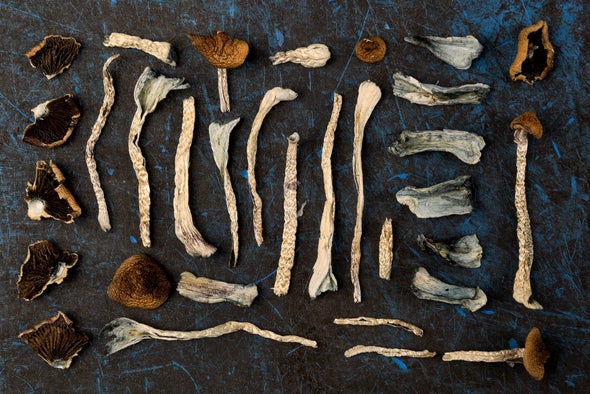SPONSOR: Mota Ventures Corp is an established natural health products company focused in the CBD and psychedelic medicine sectors. Through their powerful eCommerce business, Mota is a leading direct-to-consumer provider of a wide range of natural health products throughout the United States and Europe. Click Here for More Info


In 2012, I had my first psychedelic experiences, as a subject in a clinical trial at Johns Hopkins University School of Medicine’s Behavioral Pharmacology Research Unit. I was given two doses of psilocybin spaced a month apart to treat my cancer-related depression.
During one session, deep within the world the drug evoked, I found myself inside a steel industrial space. Women were bent over long tables, working. I became aware of my animosity towards my two living siblings. A woman seated at the end of a table wearing a net cap and white clothes, turned and handed me a tall Dixie cup.
“You can put that in here,” she said. The cup filled itself with my bilious, sibling-directed feelings. “We’ll put it over there.” She turned and placed the cup matter-of-factly on a table at the back of the room. Then she went back to her tasks.
Whenever I speak with her, Mary Cosimano, the director of guide/facilitator services at Johns Hopkins Center for Psychedelic and Consciousness Research, mentions the women in the chamber and the cup. My experience struck a chord. For me, the women in the chamber have become a transcendent metaphor for emotional healing.
“I’ve thought about having a necklace made, with the cup, as a momento,” she said the last time I saw her at a conference. “Have you thought about it?”
Prior to their 1971 prohibition, psilocybin and LSD were administered to approximately 40,000 patients, among them people with terminal cancer, alcoholics and those suffering from depression and obsessive-compulsive disorder. The results of the early clinical studies were promising, and more recent research has been as well.
The treatment certainly helped me. Eight years after my sessions, researchers continue to prove the same point again and again in an ongoing effort to turn psychedelic drug therapy into FDA-sanctioned medical treatment. This can’t happen soon enough.
“Psychopharmacology as a field had stalled. Many patients don’t respond to conventional treatment with SSRIs,” says Charles Grob, M.D., professor of psychiatry and biobehavioral Sciences at Harbor-UCLA Medical Center, and the first modern clinical researcher to treat advanced-stage cancer patients suffering from depression and anxiety with psychedelics.
There is little hard evidence to show that long-term psychotherapy is effective in treating mental illness, depression or post-traumatic stress disorder (PTSD). And there’s the cost, which fewer and fewer insurers underwrite and ordinary people can’t afford.
The failure of the psychotherapeutic process is located at its epicenter: the power disparity in the therapeutic dyad. Merely walking through the consulting room door, the patient subordinates herself to the therapist, who, by virtue of a title, is presumed to know more about her than she does herself. Transference and countertransferance—offspring of Freudian psychoanalysis—are cogs in the same moribund engine. The field will not change until the therapeutic relationship as it has been structured since the 19th century disappears.
Psychedelic drug therapy subverts the timeworn patriarchal hierarchy by creating an atmosphere of cooperation and trust rather than competition and domination. Or, to state it more bluntly, what women do in structured settings rather than what men do; women create cooperatives, men create hierarchies.
The treatment space is furnished like a lounge, with couches, chairs and table lamps. A music track plays. Two trained guides, one male, one female, are seated close by, ready to help if the emotional path becomes difficult. Guides are not therapists; instead they serve as trusted companions along a perilous, transformative spiritual journey. The sessions are led by the subject herself, by her feelings and perceptions throughout the experience and the way she processes them afterward.
“The drug is a skeleton key which unlocks an interior door to places we don’t generally have access to,” says psychologist William A. Richards, one of the researchers who successfully treated patients with hallucinogens in the 1960s and early 1970s. “It’s a therapeutic accelerant.”
MDMA (3,4-methylenedioxymethamphetamine) is rapidly proving effective in treating PTSD. MDMA is an “entactogen”: it touches within in a way talking does not. Michael Mithoefer, a psychiatrist in Charleston, S.C., who has worked with military personnel and first responders, conducted a phase II clinical trial using MDMA to treat PTSD.
“[Treatment is] not just revisiting the traumatic experiences,” he said. “It’s a process of affirming a different experience on all levels, including in the body.”
During MDMA sessions, subjects become more emotionally flexible and able to stay the course while exploring difficult memories. Many experience an enduring change in their response to emotional triggers. Clinicians hope to see MDMA approved by the FDA for PTSD treatment as early as 2022.
Treatment with psychedelic drugs represents a paradigm shift in the approach to mental health. For me, the change in the field is embodied by the presence of the busy women along my journey. The women treated my feelings as matters of fact, not to be avoided, reviled or fled from, but so obvious and ordinary they could be poured into a Dixie cup and set aside.
The success of the cancer studies has led to investigational treatment for patients suffering from intractable depression, early-stage Alzheimer’s, anorexia nervosa and smoking addiction. Within a few years, the patriarchal therapeutic model could be a thing of the past, supplanted by short-term guided treatment with psychoactive drugs.
SOURCE:https://www.scientificamerican.com/article/the-power-of-psychedelics/
Tags: #Europe, #Psilocybin, #psychedelic, #Sales, Cannabis, CBD, CSE, EBITDA, FirstClassCBD